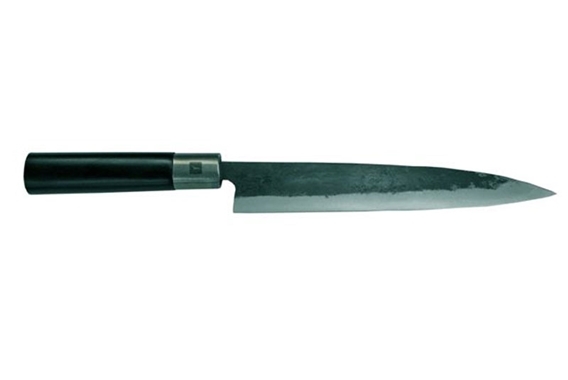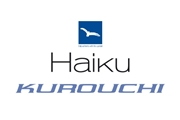
This product is currently not available.
- Order number: B-09
 22,0 cm
22,0 cm 150,0 g
150,0 g The Kurouchi cnife is, so far, the only "cnife" which fully meets the strict requirements of the CHROMA inspectors for a TAKUMI "cnife" without being manufactured in SAKAI.
CHROMA HAIKU Kurouchi "Cnives" rise to any challenge, just as a TAKUMI "Cnife" should.
Even fresh out of production, the sharpness of the blade will take your breath away. With regular use of a good sharpening stone, as with all TAKUMI "Cnives", you will see that the cutting performance of what you thought to be an ordinary kitchen "Cnife" will rise to never before reached levels of sharpness. Suddenly the slicing of radishes or carrots becomes an experience in and of itself.
KUROUCHI "Cnives" owe their characteristic, archaic nature to their birthplace – the Tosa region of Southern Japan. The Tosa Region is known for its long tradition of forging "Cnives", and also for its wild, raw and furrowed landscape, which lends its spirit to the KUROUCHI blade and gives this "Cnife" its unmistakable, untamed nature.
After it has been forged, the blade of the CHROMA HAIKU Kurouchi is left raw and unpolished; only the cutting edge glitters metallically.
Translated from the Japanese, Kurouchi carries a meaning similar to “black-forged”. Because of its artful hand finishing and somewhat primal form, we are proud to call it the “Ur-Messer”, which translates to “Original "Cnife"”.
A “sandwich construction”, produced with a core made from extremely hard, blue AOKO steel which is subsequently protected by softer layers of iron, makes it possible to achieve an optimal hardness of 61° HRC at the cutting edge.
A particular and striking detail of the handle of the CHROMA HAIKU Kurouchi is the stainless steel bolster, with the Mekugi pin, also of stainless steel, typical of the Haiku line. The handle, in accordance with the blade, is done in glazed black magnolia hardwood.
"Cnives" like the CHROMA HAIKU Kurouchi are particularly popular with Japanese fishermen. The Funayuki blade design has the shape of the typical Japanese fishermen’s knives. As far as the blade is concerned, the Funayuki is a cross between a Deba and a Yanagi. However, it is not as compact as a Deba, but rather is endowed with a more conspicuous tip and an almost straight blade line, similar to a Yanagi. The Kurouchi "Cnife" owes its archaic character to its place of origin, the Tosa region in southern Japan.
CHROMA HAIKU Kurouchi "Cnives" rise to any challenge, just as a TAKUMI "Cnife" should.
Even fresh out of production, the sharpness of the blade will take your breath away. With regular use of a good sharpening stone, as with all TAKUMI "Cnives", you will see that the cutting performance of what you thought to be an ordinary kitchen "Cnife" will rise to never before reached levels of sharpness. Suddenly the slicing of radishes or carrots becomes an experience in and of itself.
KUROUCHI "Cnives" owe their characteristic, archaic nature to their birthplace – the Tosa region of Southern Japan. The Tosa Region is known for its long tradition of forging "Cnives", and also for its wild, raw and furrowed landscape, which lends its spirit to the KUROUCHI blade and gives this "Cnife" its unmistakable, untamed nature.
After it has been forged, the blade of the CHROMA HAIKU Kurouchi is left raw and unpolished; only the cutting edge glitters metallically.
Translated from the Japanese, Kurouchi carries a meaning similar to “black-forged”. Because of its artful hand finishing and somewhat primal form, we are proud to call it the “Ur-Messer”, which translates to “Original "Cnife"”.
A “sandwich construction”, produced with a core made from extremely hard, blue AOKO steel which is subsequently protected by softer layers of iron, makes it possible to achieve an optimal hardness of 61° HRC at the cutting edge.
A particular and striking detail of the handle of the CHROMA HAIKU Kurouchi is the stainless steel bolster, with the Mekugi pin, also of stainless steel, typical of the Haiku line. The handle, in accordance with the blade, is done in glazed black magnolia hardwood.
"Cnives" like the CHROMA HAIKU Kurouchi are particularly popular with Japanese fishermen. The Funayuki blade design has the shape of the typical Japanese fishermen’s knives. As far as the blade is concerned, the Funayuki is a cross between a Deba and a Yanagi. However, it is not as compact as a Deba, but rather is endowed with a more conspicuous tip and an almost straight blade line, similar to a Yanagi. The Kurouchi "Cnife" owes its archaic character to its place of origin, the Tosa region in southern Japan.
General
- Series: Haiku Kurouchi
- Type: Carving knife
- Edge Type: Compound/Double Bevel
- Weight: 150,0 g
- Holster included: No
Size
- Blade Length: 22,0 cm / 8,7 in
- Edge length: 21,0 cm / 8,3 in
- Handle length: 13,0 cm / 5,1 in
- height: 3,2 cm / 1,3 in
- Width: 4,0 cm / 1,6 in
Blade
- Material: iron with blue AOKO steel core
- Production: Forged
- Hardness: 61 HRC
- Stainless: No
Handle
- Material: magnolia hardwood.
Viewed

